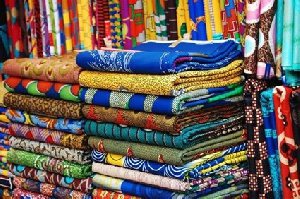A tax stamp policy aimed at enhancing the competitiveness of local textile producers is to be rolled out on November 15, Trade Minister Alan Kwadwo Kyeremanten has told Parliament.
“The introduction of tax stamps on textile prints will give buyers the confidence and assurance that they are buying genuine textile fabrics and that local designs have not been pirated,” he told Parliament on Wednesday when he appeared before the House to answer questions relating to his ministry.
According to the minister, the tax stamp policy measure will also ensure that appropriate duties are paid on imported wax-prints.
To this end, government has outlined six new policy measures to be introduced with effect from November 15, 2018.
They include: introduction of tax stamps for locally manufactured as well as imported textiles; introduction of a single, dedicated entry corridor for imported textiles products -Tema Port.
Others are: implementation of a textile import management system to coordinate all imports of textiles, including vetting designs and logos.
There is also provision of support and incentives for local manufacturers to improve their competitiveness, and conducting market surveillance exercises by the textile task-force to monitor compliance with the new policy.
Furthermore, he added, local manufacturing companies are not against the importation of textile prints as long as the appropriate duties are paid and there is no piracy of designs and logos.
Establishment of the Ghana International Trade Commission (GITC), he noted, will among other things provide oversight in the textile sector to protect domestic manufacturers from unfair trade practices as stipulated under WTO rules.
The ministry, through the Swiss Ghana Intellectual Property Project, is also training Police and Customs Officers in the enforcement of Intellectual Property Rights – which will contribute to finding appropriate solutions to some of the challenges confronting the textiles sector.
He also reiterated government’s commitment to implementing these measures by working closely with relevant MDAs, particularly the Customs Division of Ghana Revenue Authority, National Security, Workers Unions, wholesale and retail traders to enhance competitiveness of the textiles sector.
Background
The textile manufacturing sector in Ghana has been confronted with very significant challenges over the last three decades, including piracy of indigenous designs and logos of wax-prints, as well as non-payment of duties and taxes on imported textile prints.
As an illustration, the total revenue from duties on imported textiles recorded for 2016 was only GH¢1.7m against a projected revenue of over GH¢56m. This is based on the fact that the total local demand for wax-prints is estimated at 120m yards per annum, while total production from the existing three (3) local manufacturers is less than 40m yards – leaving a deficit of 80m yards imported annually.
According to the minister, unfair trade practices in the textile sector have literally collapsed local manufacturing companies – leading to a significant reduction in the number of employees in the sector, from a record high of 30,000 in the early 90s to a current level of less than 5,000.
He explained that it was against this background that the ministry on June 1st 2018, initiated a nationwide stakeholder consultation exercise in Accra, to develop a comprehensive and integrated reform programme to provide a sustainable solution to this canker.
The consultation exercise involved all the major stakeholders including Management and Local Unions of the Local Textiles Manufacturers; Leadership of both the Industrial and Commercial Workers Union (ICU); and the Textiles, Garment and Leather Employees Union (TGLEU); Wholesalers and Retailers Associations; the Consumer Protection Agency and relevant Ministries, Department and Agencies (MDAs).
These consultations and sensitisation exercises have continued to date in all major market centres – Aflao, Takoradi, Tamale, Kumasi and Accra.
Business News of Thursday, 8 November 2018
Source: thebftonline.com

















